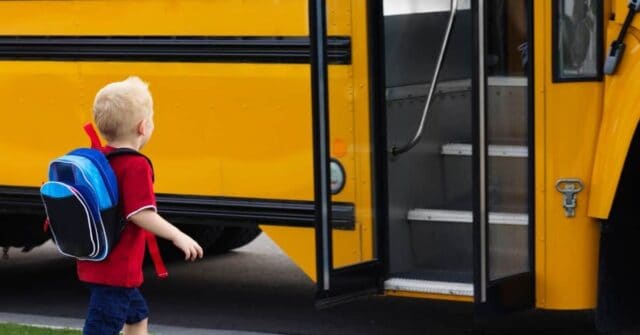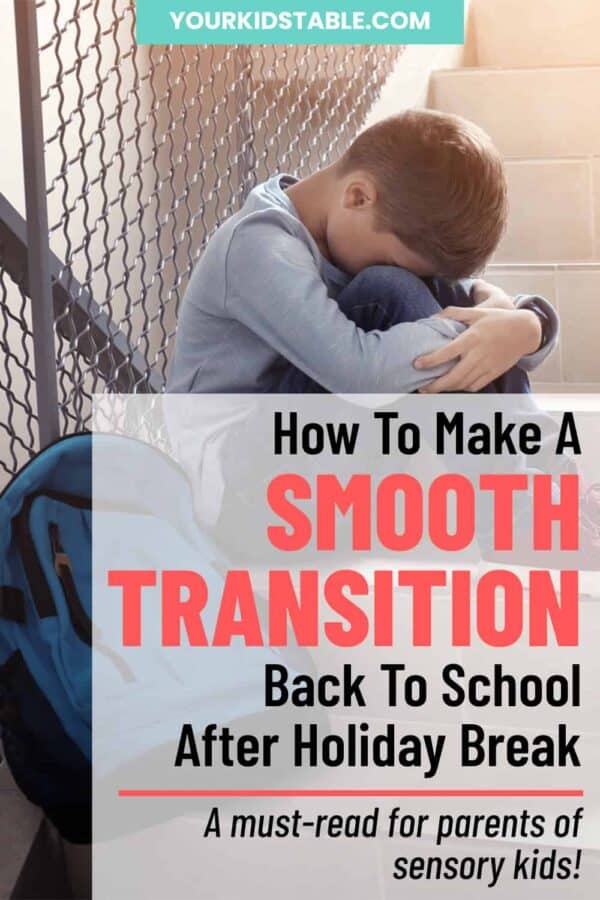It’s common for kids to struggle to transition from the mid-year long holiday break to returning to school. Learn how to help your child have as smooth of a transition as possible this year! A must-read for kids with sensory processing needs, SPD, ADHD, anxiety, and ASD.
I had no idea what had happened. My son never had a problem going to school or leaving me. I didn’t see it coming when in first grade, after the long holiday break, he began crying and freaking out that he had to go back to school. He couldn’t tell me why, he just didn’t want to go.
And, these weren’t just a couple of tears, he freaked out in our kitchen as we packed up his book bag. He sobbed as his two little brothers and I walked him up to the bus stop. Then, he pushed and tried to run away when it was time to get on the bus.
My compassion by that point had gone out the window.
I HATE to admit this, but I was annoyed, and just wanted him to get on the bus. I yelled at him, trying to talk some sense into him.
It didn’t help. I was so caught up in him needing to get to school, and that this behavior all seemed so sudden, that I missed that he was having a hard time transitioning.
He needed my support.
And, it wasn’t the last time he did. Since then, I’ve had our other kids struggle, in their own ways, with transitioning back to school after the long holiday break too.
Why is the Transition Back to School After Holiday Break So Hard?
In my son’s case, while he had previously always been fine with school, first grade was a lot more demanding than his half day of kindergarten had been. I thought he was just plugging along the first half of the school year, and he was, but he was also getting anxious because he had a very strict teacher that didn’t allow the kids to get up from their desks very often.
He couldn’t express this to me, he loved his teacher, but in the coming weeks, we began to see that he was feeling stressed at school.
His crying and meltdown was a result of him feeling like he was trapped and he didn’t want to return to the anxiety he felt at school.
For other kids, they may be tired and not getting enough rest so they have a hard time transitioning back to school. And, some kids may be struggling with overwhelm from all the lights, sounds, and physical touch from others in the classroom.
Some kids may need to move a lot, and feel restricted at school, even if they have a teacher that allows them to get up from their desk.
Kids also might not feel secure being away from home, they worry about you or themselves when you’re not together.
Other kids might resist transitioning back because school is hard. They don’t always understand what the teacher is teaching, and feel lost when they have to complete their work.
Of course, some kids also struggle to connect with their peers, or they could be being bullied.
After the long holiday break, kids have gotten a reprieve. They’ve rested, had fun, been close to you. Often, the thought of having to step back into the overwhelm or stress that school is causing them seems overexaggerated because they were getting up everyday just 2 weeks ago and going without this much of a problem.
But, the break they had gave them a sense of peace, and perspective. In their minds, it’s as if “Wait, life is so much better without going to school, I don’t have to feel stressed/worried/embarrassed/etc. I don’t want to go back there!”

Which Kids are More Likely to Have a Difficult Time Transitioning Back to School?
Truly any child can have a hard time transitioning going back to school, because many kids are likely to experience some challenging social dynamics or learning difficulties at some point in their school years. But, kids that have these factors are way more likely to consistently struggle with transitioning back to school after a long holiday break:
- Sensory Processing Difficulties (including kids without a diagnosis, or with SPD, ADHD, or ASD)
- Anxiety
- Learning difficulties, delays, or disabilities
- Social difficulties or delays
Each of these can cause kids stress, so of course they’ll want to avoid it. Depending on a child’s age, you’ll see that displayed in a variety of ways from crying, melting down, and arguing to lying, all to avoid going back to school.
Click here to get a Checklist of 21 Sensory Red Flags that You Might Be Missing
How to Make a Smooth Transition Back to School after the Holiday Break
No matter what the reason is that your child struggles to go back to school after the holidays, you can take some simple steps to help make the transition much smoother.
If you can have a couple of ways to help them in your back pocket, ahead of time, you’ll feel more confident and will be less likely to feel exhausted and frustrated. Here are some steps you can take:
#1. Talk about going back to school days ahead of time
Lots of kids will benefit immensely from reminders that a return to school is coming soon because it helps them mentally prepare for the transition, instead of being surprised the day before.
If you remind your child at any point and they say they don’t want to go, THIS is an opportunity to find out why! We often forget to ask this, or brush off their feelings because it’s something they have to do anyways.
One of the biggest lessons I learned from my massive parenting fail when my son had difficulty transitioning back to school was that there was a reason. All behavior is communication, and his crying and tantrums were trying to tell me what he couldn’t put into words.
The same is true for your child. To get to the bottom of it, ask open ended questions like:
- Why don’t you want to go back to school?
- Tell me about your classroom.
- Tell me about your least favorite part of the day.
- Tell me about what you like best at school.
Then, if they say something like, “I don’t like my classroom/teacher/Tommy/etc.” Follow up with, “What don’t you like about your classroom/gym class/Suzie/etc.”
Really try to listen here, and don’t offer any solutions right away. It’s important to help them express themselves. It took several weeks for my son to eventually give us some clues that his strict teacher was stressing him out.
Once we knew what the problem was, we could begin to give him coping strategies for managing it. You’ll be able to do the same!
#2. Set up a playdate or two with school friends
My family was recently quarantined for 2 weeks. The kids missed a lot of school. I knew the transition back was going to be difficult on one of my other sons, who’s in 4th grade. I didn’t have to remind him about school coming, he knew it, and was telling me that he was getting worried thinking about going back.
We talked about it, of course, and he said he felt weird having been gone so long and that nobody had seen him.
To help him cope with those feelings, the night before he returned to school (his quarantine was lifted) he had the opportunity to go to a fun kid’s night at our church with some kids from his school. He hesitated, saying maybe it would be better to skip it. I encouraged him to go because I suspected connecting with some school friends would help him feel more comfortable.
It did!
And, I couldn’t believe how easy the transition went the next morning, I believe in large part it’s because he “broke the ice” by socializing with some school friends first.
In the day or two before your child returns to school, look for or create a playdate with school buddies!
#3. Play on the school playground
If your child’s school has an open to the public playground, take your child to it the day before they return. This is another way to break the ice, and get them reacquainted with returning to school.
#4. Prep some helpful transition items
Ask your child if there’s anything special they’d like to get ready to help them with going back to school. Don’t be surprised if they have some ideas, and if it’s something that’s appropriate, even if it seems strange to you, make it happen.
Not only will your child see this as you supporting them, but it also empowers them to recognize that they can help themselves.
The transition items can be anything from a stress ball to a journal to a favorite water bottle or piece of gum for the bus ride home. I have some more specific ideas for you below.
#5. Get to bed early 2-3 days ahead of time, and wake up on time
Helping kids get back to all aspects of their morning routine, will help make the transition smoother, and this includes sleep!
Kids are often staying up and sleeping in late over the holidays. This can cause a problem the night before school starts again because if they slept in late that morning, they probably won’t be ready for their regular school bedtime. That means they’re up late and up early the next morning with not enough sleep.
When any of us, including kids, are sleep deprived, we can get irritable, combative, and more anxious. Everything we want to avoid on the first morning before returning to school.
To avoid this scenario, try to get your kid in bed close to their regular school bedtime for 2-3 days before going back to school.

#6. Expect your child to have a hard time
If your child has ever had any trouble transitioning back to school, at any time, even just over the weekend, you’ll be in a much better place to support them after the holiday break if you anticipate that they’ll have a hard time.
I’ve been guilty at times of just hoping that it’s not a problem. If it is, and I haven’t mentally prepared myself, I tend to get frustrated because “my hope” didn’t come true.
I have a feeling I’m not alone in this.
So mentally plan on the first day back being a rough morning, and then, if it’s not, you can be pleasantly surprised. If it is, you’ll be far less frustrated.
#7. Call in supports
If your child has particularly difficult transitions, on a consistent basis, you may want to ask your spouse, partner, another caregiver, or grandparent to go to work late or come over to help you in the morning, especially if you have other children you’re managing.
#8. Decompress and debrief
When your child gets home that first day, they may need time to decompress. Ask a quick question or two about how their day went, and then allow them space to relax or get some physical activity.
After they’ve had a chance to decompress ask more open ended questions about their day….
- How did they feel at school today?
- What was the best part of their day?
- What was the hardest part of their day?
Give them a chance to talk as much as possible, listening and sharing in your understanding. If they’re able to identify what was hard, again ask them if they have any ideas about what could help them, and make a plan to include those. If they can’t come up with any, make some suggestions for them to choose from.
And, while none of us wants to the be the overbearing parent, reaching out to the teacher for additional support is helpful and appropriate in some situations.

Tools and Toys that Can Help with the Transition Back to School
Need some ideas for supports for your kids? This can vary widely, depending on what it is that’s making the transition back to school difficult, but the following cover a wide range of needs:
- Fidget toys – Some fidget toys are banned in schools because they cause too much distraction. But, some like the classic stress ball can easily be left in your child’s pocket and squeezed for some calming sensory input. Get a whole list of fidget toys appropriate for school here.
- Roll on essential oil – You can swipe an essential oil across your child’s wrist to help calm them down, and encourage them to smell it whenever they need to. You can also send the roll on to school with them. This is a tranquility blend from Rocky Mountain Oils.
- Compression shirt or “new” shirt, socks, or hat – Deep pressure is calming for some kids, layering a compression shirt under their clothes might be grounding for your child. Or, choose a favorite or new shirt, fun socks, or hat to wear back to school, which can give them something to get excited about when they’re not wanting to go back to school.
- Special lunch – Pack a special lunch, with a silly note or drawing inside. Tell them they’ll be surprised when they get to school to see what it is.
- Journal or notebook for writing or drawing – Put a journal or notebook in your child’s bookbag, if they like to write or draw. You can ask them to make you a picture while they’re on the bus or when they have free time.
- Favorite or new book – Books can be a positive distraction from overwhelmed or anxious feelings. If they got a new one over the holidays, have them put it in their book bag so they can look at or read it.
- Chewing gum or lozenge – If the school or bus allows chewing gum, this is a great option that kids get excited about and also helps calm them down because chewing gives lots of proprioceptive feedback. A lozenge or a hard candy also gives calming sensations, if they’re allowed.
What To Do If Your Child Totally Freaks Out Anyways
If you use all of the strategies above and the morning of school comes and they still lose their mind, it’s okay. Sometimes, we can do all the things and our kids might still fall apart.
In that moment, try to keep yourself calm, and know that tomorrow is a new day when you can try again.
Then, consider emailing the teacher, even if for your own peace of mind, to let them know they had a rough start to the day.
When your child gets home from school, talk about how they were feeling in the morning (after they’ve had time to decompress), and maybe they’ll express themselves more completely or be willing to try some of the tools they didn’t on the first day back.
Sometimes, it’s a several day process for helping your child transition back to school. Give yourself some self-care for managing all the big emotions and focus on little steps!
There you have it. My hope is that you have some solid steps you can take to help your child make a smooth transition back to school this year! If you’ve gone through a difficult transition of returning to school, please share it in the comments! We can all learn from each other!
More on Difficult Transitions
4 Simple After School Routines That Will Cut Out Chaos
How to Create a Summer Sensory Routine for Your Kid
The Top 10 Ways to Avoid Autism Meltdowns!
Alisha Grogan is a licensed occupational therapist and founder of Your Kid’s Table. She has over 17 years experience with expertise in sensory processing and feeding development in babies, toddlers, and children. Alisha also has 3 boys of her own at home. Learn more about her here.

Thank you for this helpful article! One of my daughters’ struggles often with getting to school but more so after long weekends and holiday breaks. Although we always try to plan for it and put things into place it can feel daunting and lasts many days. Thanks for the ideas we will definitely be putting more of these into place.
You are so welcome! We know how hard it can be! Hope these help and you have a smooth transition!
Best,
Desiree
Wow, this was so helpful! I hate weekday mornings in our house because they are so stressful, and what makes it especially bad for me are the constant exclamations of my daughter “I don’t want to go to school!”. It is much worse after weekends or if she has been off school for longer. I did not realise that it had to do with stress she experiences at school – but you are right, of course it does! And it makes so much sense. Only this realisation would have been enough for me to understand what is actually happening in our house, and the helpful tips on what to do about it are a total bonus! Thanks so much for such a helpful post, I am so happy that we are not the only family struggling with this, a total eye opener for me!
Hey Marta!
Oh we’re so glad to hear that this has been helpful and eye opening for you! We know it can be really hard to see what is going on, especially in the moment if there is a meltdown happening when you need to get out the door. You definitely aren’t the only one struggling with this, it’s absolutely so common and something we’ve dealt with as well!
Best,
Andrea